The Best Iron supplements for Pregnancy
If you are looking for the best iron supplement to take while pregnant, then you have come to the right place. In this article we’ll cover:
Are you pregnant and wondering if it’s OK to take iron supplements? In this guide we’ll answer your questions, and help you understand the role iron plays in pregnancy.
How much iron does a pregnant woman need?
There is an increased need for iron when pregnant. During this time, the amount of blood in your body increases by 30-50%. This increases the requirement for iron in your body as it’s needed to make haemoglobin, which carries oxygen to other cells in your body.
Research shows that many women do not have sufficient iron in their diet to meet their daily needs. This is also true during pregnancy, especially during the second and third trimesters when dietary iron requirements can increase to as much as 30mg per day.
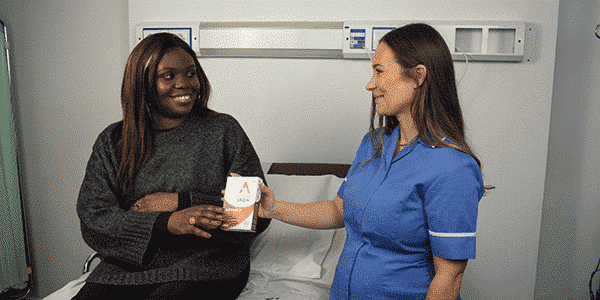
Avoiding low iron in pregnancy
There are two types of iron found in the diet, non-heme and heme. Non-heme iron is found in plants, nuts and legumes. This is absorbed at a much lower rate than heme iron, which is found in animal products such as meat, especially red meat.
It’s important to remember that even if you are making a conscious effort to ingest more heme iron, by eating meat, most health authorities recommend a safe upper intake of only 500g of red meat per week. Also, other daily habits like drinking tea and coffee after your meals can reduce iron absorption.
You can get iron from food, but it may not be absorbed well, and it may not be sufficient to meet your increased requirements during pregnancy.

Iron supplements could benefit pregnant women who are unable to meet their dietary iron requirements. However, food supplements are not a substitute for a varied diet and a healthy lifestyle.
Iron is an essential mineral and this applies even more so to pregnant women. Click here to check out the Active Iron store. Active Iron is highly absorbed compared to other iron supplements, making it strong enough to increase iron levels whilst being gentle on the stomach¹.
Iron Supplements in pregnancy
There are many iron supplements available over the counter. Ferrous sulfate is considered the ‘gold standard’ and is the most commonly recommended form of iron in the UK and Ireland.
Most iron supplements dissolve in the stomach. This can lead to oxidation and gut inflammation, which can lead to common side effects associated with iron supplements, such as constipation and nausea.

Active Iron has a unique non-constipating formula that helps reduce gut irritation from iron. Formulated by scientists, Active Iron is clinically proven to increase iron levels while being gentle on the stomach².
The Best Iron Supplements for pregnant women
Active Iron has a range of iron supplements that are suitable for preconception, during pregnancy, and postnatally.
Active Iron Pregnancy
Active Iron Pregnancy provides the essential nutrients mum and baby need throughout each trimester. During pregnancy, your blood volume expands by up to 50% and nutritional requirements increase to support the healthy development of your growing baby. This boosts your requirement for iron and other key nutrients. Active Iron Pregnancy contains non-constipating Active Iron plus a complete time-release multivitamin providing all the key nutrients mum and baby need throughout pregnancy including:
- Iron and B Vitamins (B2, B5, B6, B12 and biotin) to support energy production and help fight tiredness and fatigue
- Iron to support blood building and oxygen transport
- Folic acid as highly absorbable L-methylfolate to help support foetal development **
- Vitamin D, vitamin C, zinc and iron to support immune function
- Vitamin B5 to support mental performance and iron, iodine and zinc to support cognitive function
- Calcium, magnesium, vitamin D and vitamin K to support bone and muscle health
- Vitamin B6 to help regulate hormonal activity
- Vitamin E, copper and selenium to help protect cells from oxidation
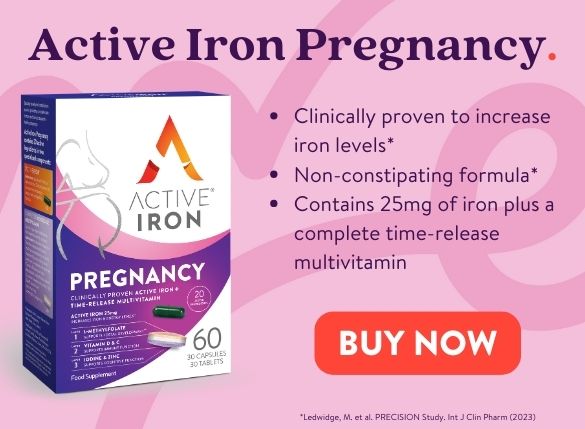
Active Iron Advance
Active Iron Advance is clinically proven to increase iron levels and support haemoglobin formation. It contains the same high dose as Active Iron Pregnancy Plus so it is ideal throughout all stages of pregnancy, whether you are prenatal, pregnant or postnatal, you can even take it while breastfeeding.
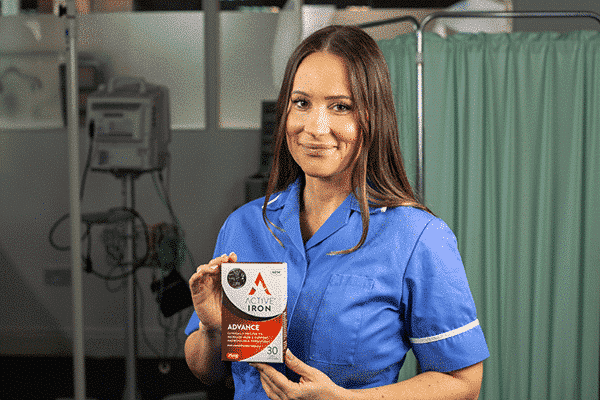
Active Iron Advance Review
“Very good iron capsules – I normally have a very upset stomach when I take the iron tablets given by my Doctor. I bought these and I am doing very well on them. Many thanks” – Jane Laffan
Review Source
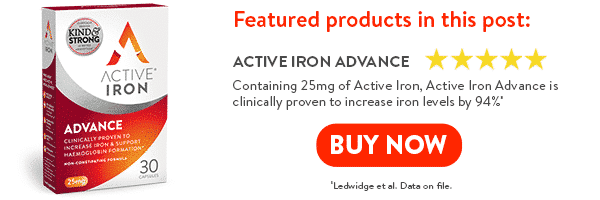
Pregnancy Iron Supplements FAQ’s
What is the best iron supplement for pregnancy without constipation?
Active Iron is clinically proven to help avoid common iron side effects such as constipation, nausea, and diarrhoea².
What are the best over the counter iron supplements for pregnancy?
Active Iron can be considered to be one of the best over the counter iron supplements you can take during pregnancy because it is clinically proven to increase iron levels whilst helping to avoid common side effects such as nausea and constipation².
Are there any side effects from taking iron supplements in pregnancy?
While common iron supplement side effects can include nausea, constipation, diarrhoea, Active Iron is clinically proven to help avoid these side effects as it is highly absorbed.
What are the benefits of taking iron supplements when pregnant?
Iron intake plays a vital role in supporting a healthy pregnancy for both mum and baby but may also lead women to having more enjoyable pregnancies in general, by helping to reduce symptoms such as tiredness and fatigue.
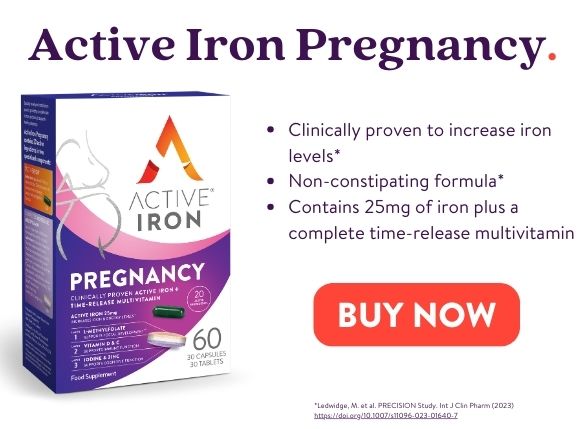
¹Wang et al. 2017, Acta Haematologica, 138: 223-232. ²Ledwidge et al. 2021, Data on file. doi: https://doi.org/10.1101/2021.09.01.21262983










